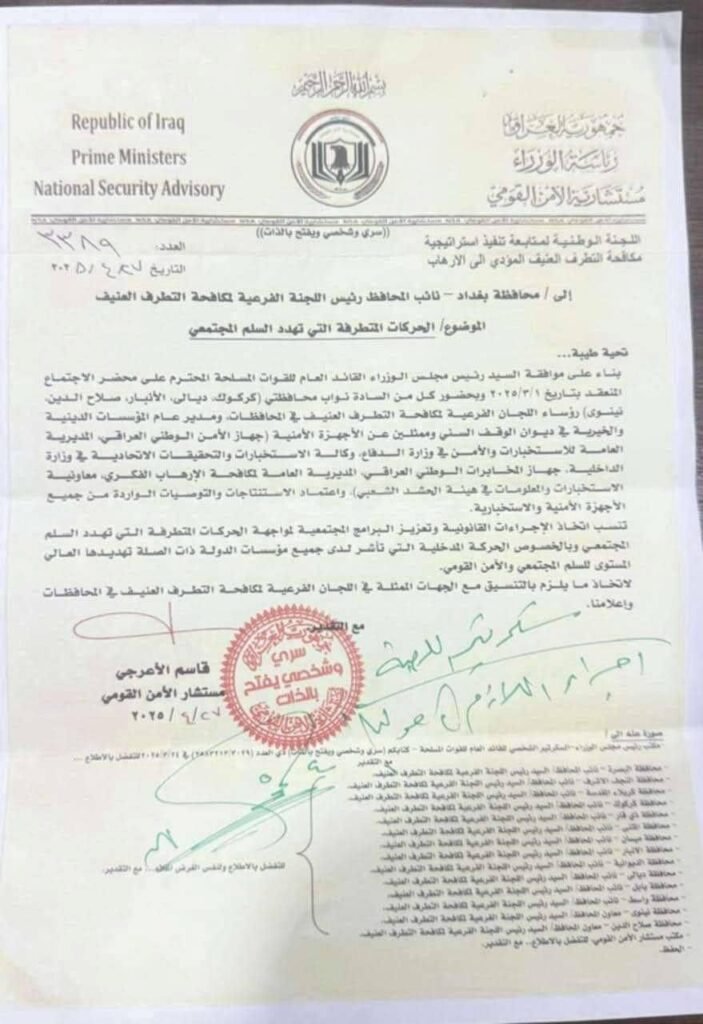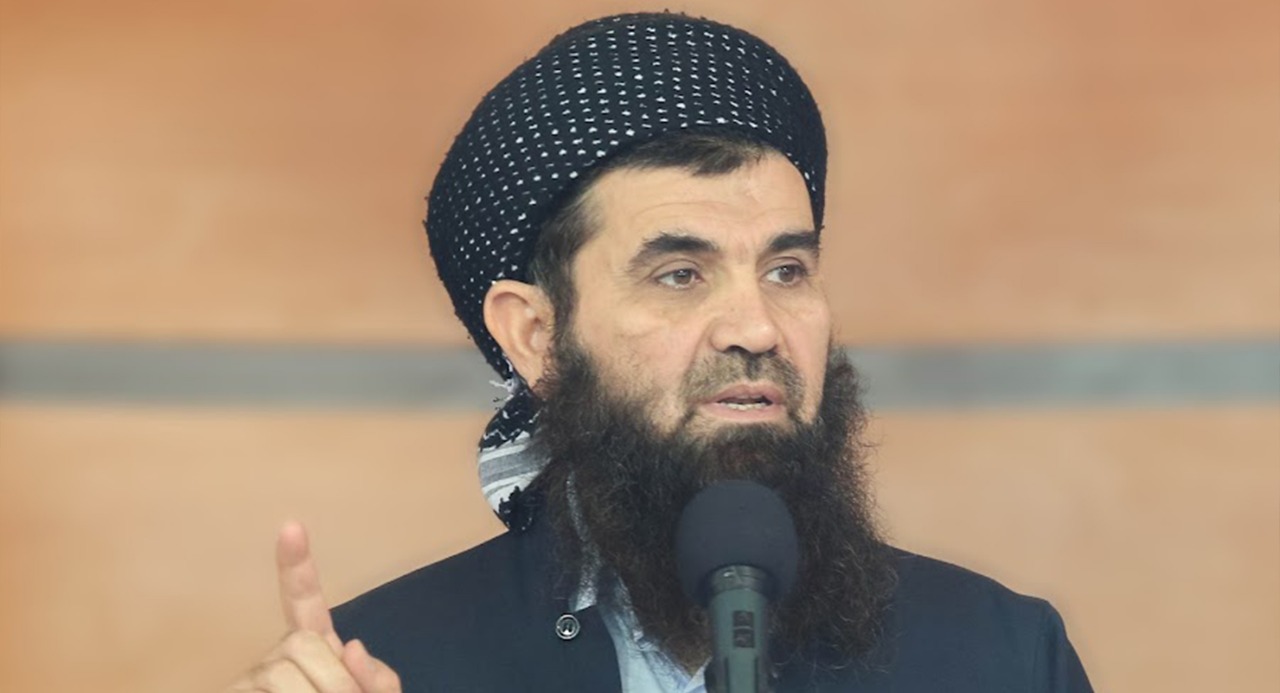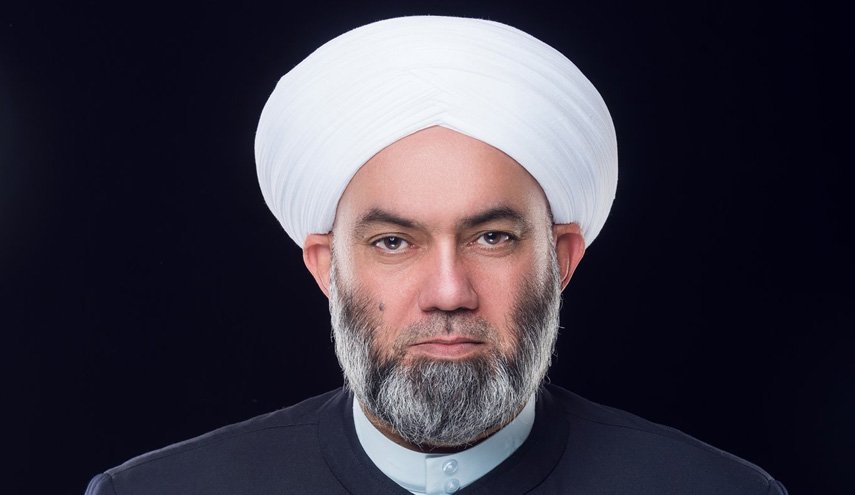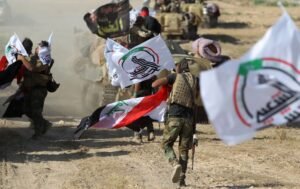Written by
Explainer: Why Did Iraq Ban the Madkhali Salafist Movement?

In a controversial move, Iraq’s National Security Advisory Council issued a secret but now-public directive on April 27, 2025, labeling the “Madkhali Salafist” movement a national security threat and ordering action against it. The move has sparked uproar across Iraq’s Sunni landscape, revealing deeper political, sectarian, and ideological struggles shaping the country’s post-ISIS religious order.
This explainer unpacks the origins of the decision, the nature of the Madkhali movement, and what the broader implications may be.
What Is the Madkhali Movement?
The Madkhali trend—named after Saudi scholar Rabee bin Hadi al-Madkhali—is a branch of modern Salafism that champions political quietism and absolute obedience to rulers. Emerging in the early 1990s in Saudi Arabia, it gained traction for opposing the politically activist “Sahwa” Salafists and for supporting the Saudi regime’s decision to host U.S. troops during the Gulf War.
Core to the Madkhali doctrine is the belief that rebellion or political activism against Muslim rulers—no matter how corrupt—is forbidden unless they display unequivocal disbelief. This posture aligns them with state authority and makes them hostile to both jihadist and civil Islamist currents.
Madkhalis also reject Sufism, Shiism, and political Islam, advocating a purist, text-based form of Sunni Islam with theological roots in Ibn Taymiyyah and Hanbali traditionalism. They oppose taqlid (blind adherence to traditional scholars) and instead promote direct interpretation of scripture by qualified scholars—usually themselves or those in their lineage.

The Iraqi Chapter
Before 2003, the Madkhali presence in Iraq existed only as scattered individual cells without institutional structure. The post-invasion security vacuum and newly open religious landscape provided fertile ground for expansion. The movement rapidly grew in Baghdad’s mosques and other Sunni-majority cities.
A pivotal moment came in 2007 when their local leader, Abu Manar al-Alami, delivered a controversial lecture prohibiting fighting against U.S. forces. He argued that conditions for legitimate jihad were not met and that opening fire on soldiers in cities endangered civilians. He encouraged Sunnis to join the Iraqi army and police, break political boycotts, and integrate into the post-Saddam state.
This position aligned perfectly with the global Madkhali principle of obedience to the current authority and made them a favored Sunni current among successive Iraqi governments. They gained significant influence within the Sunni Endowment Office, acquiring the ability to remove rival imams and appoint loyalists to key positions.
Why Ban Them Now?
The sudden ban on a movement known for its pro-government stance has puzzled observers. Several interconnected factors appear to be at play:
1. The Rise of Competing Sunni Movements
According to analyst Yahya al-Kubaisi, the ban cannot be understood outside its political context. At the heart of the issue is the emergence of a new Sufi group called Rabita Muhammadiyah (The Muhammadan League), which has gained backing from Iran-aligned Shiite political factions.
This group, based in Anbar and Fallujah and tied to the al-Alusi family, represents a dramatically different approach to Sunni Islam:
- It openly supports Shiite militias and the Popular Mobilization Forces (PMF)
- It promotes inter-sectarian unity on terms favorable to Shiite political interests
- It has pushed Shiite narratives like Eid al-Ghadir within Sunni communities
- It receives substantial financial support and official media platforms from the government
The Madkhalis, with their doctrinal rigidity and Saudi connections, represent an obstacle to this project of reshaping Sunni religious identity in Iraq.
Core Beliefs of the Madkhali Salafist Movement
Absolute Obedience to Rulers
Complete obedience to Muslim rulers (wali al-amr) is mandatory, even if they are immoral, as long as they don't show "clear disbelief." This extends to non-Muslim rulers in authority.
Anti-Political Activism
Rejection of all forms of political opposition, protests, demonstrations, and party politics. These are viewed as sources of division and chaos (fitna) that must be avoided.
Doctrinal Purism
Strict adherence to Quran and Hadith as interpreted by early Islamic generations. They reject what they consider innovations in religious practice, maintaining theological purity.
Opposition to Islamic Movements
Deep criticism of activist, jihadist, and civil Islamist movements, including the Muslim Brotherhood. They view these groups as "partisan" and divisive to the Muslim community.
2. Iranian Influence and Sectarian Politics
The timing and nature of the ban suggest influence from Iran’s Revolutionary Guard Corps (IRGC), which has a long history of using religious institutions to shape Iraq’s sectarian order. The move aligns with broader efforts to dilute Saudi-linked religious influence and replace it with actors more pliant to Iran’s vision of intra-Iraqi unity, one centred on allegiance to Shiite-aligned state narratives.
Political researcher Abdul Qader al-Nayel describes the ban as “a blatantly sectarian move” designed to target Iraq’s Sunni identity by weaponizing state institutions. He notes that while Madkhalis are accused of extremism, no similar action has been taken against Shiite groups that openly declare Sunnis as disbelievers or reject Iraq’s Najaf religious authority.
3. Internal Sunni Conflicts
The ban also reflects long-standing disputes within Iraq’s Salafist community. Since 2003, Iraqi Salafists have split into three main factions:
- Those who participated in armed resistance against U.S. forces
- The Madkhalis, who postponed fighting and warned against rebellion
- Abu Manar al-Alami’s faction, which actively cooperated with US forces
These internal conflicts escalated over the years, with mutual accusations of deviation and betrayal. Reports suggest that al-Alami’s group submitted complaints against the Madkhalis to authorities, accusing them of incitement and sowing discord within security and religious institutions.
4. Political Calculations in an Election Year
The timing of the ban during an election year suggests political motivations. By targeting a Sunni religious movement, even one known for political quietism, authorities may be attempting to:
- Demonstrate control over religious discourse
- Appeal to certain Shiite constituencies
- Test the boundaries of religious freedom without significant political cost
Why Ban Them Now?
1 Rise of Competing Movements
The Iran-backed Rabita Muhammadiyah group is emerging as the state's preferred Sunni authority, openly supporting Shiite militias and promoting sectarian unity on Shiite terms.
2 Iranian Influence
Sources suggest the Revolutionary Guard Corps influenced the decision through Iran-backed factions in Iraq's security apparatus, aiming to create more pliable Sunni leadership.
3 Internal Sunni Conflicts
Long-standing disputes between Salafist factions escalated, with rival groups submitting complaints against Madkhalis, accusing them of sowing discord in institutions.
4 Election Year Politics
The timing suggests political calculations to demonstrate control over religious discourse and appeal to certain constituencies without significant political cost.
The Broader Goals
Reshaping Sunni Authority
Remove doctrinally independent groups with Saudi connections to elevate state-compliant alternatives like Rabita Muhammadiyah.
Setting Precedents
Create legal framework to ban religious movements using security classifications, applicable to other non-aligned groups.
State Control of Religion
Assert government authority over religious discourse and demonstrate willingness to target even politically compliant movements.
The Broader Goals
Reshaping Sunni Religious Authority
The primary goal appears to be a fundamental restructuring of Sunni religious authority in Iraq. By removing the Madkhalis—who, despite their quietism, maintain doctrinal independence and Saudi connections—the government can elevate more compliant alternatives like the Rabita Muhammadiyah.
This represents an attempt to create what al-Kubaisi calls “a deliberate attempt by Shiite political actors to purge the Sunni arena of any doctrinal movement that could resist or expose the political motives behind [their] ideological project.”
Setting Precedents for Future Actions
Analysts caution that the Madkhalis may be a starting point. Political researcher Abdul Qader al-Nayel believes the ban is part of a longer-term campaign to marginalize independent Sunni intellectual movements and reshape Sunni identity under the watch of Iran-aligned groups.
He asks why more radical Shiite groups—such as Shirazi factions or proponents of Wilayat al-Faqih who openly denounce Sunnis—have never been designated security threats. The selective enforcement, critics argue, reveals the political motivations behind the move.
Consolidating State Control Over Religion
By demonstrating its willingness to ban even politically compliant religious movements, the state sends a clear message about its authority over religious discourse. This aligns with broader regional trends of governments asserting greater control over religious institutions and narratives.
Reactions and Resistance
The ban has provoked significant opposition, particularly from Sunni political blocs:
- Parliament Speaker Mahmoud al-Mashhadani announced plans to form an investigative committee, arguing that the ban violates constitutional protections for freedom of belief and expression.
- The Siyada Alliance, led by Khamis al-Khanjar, warned that such measures might backfire, pushing followers toward isolation and extremism. Khanjar personally visited a Madkhali-affiliated mosque in a high-profile show of support.
- Kurdish Salafi leaders like Abdul Latif Ahmed, while distancing themselves from Madkhali ideology, criticized the ban as a blow to religious freedom that could create sectarian tension.
Notably, Saudi Arabia—traditionally a supporter of Salafist movements—has remained silent, reflecting Crown Prince Mohammed bin Salman’s recent moves to reduce religious influence in the kingdom.
Prominent Sunni, Madkhali vs Sufi Religious Figures in Iraq
Prominent Madkhali (Quietist) Salafi Figures

Sheikh Abu Manar al-Ilmi (Muhammad Khudair)
Salah al-Din (Tikrit/Al-Alam)
Iraq's leading Madkhali Salafi ideologue post-2003. Architect of the Madkhali trend via Rabi’ al-Madkhali’s quietism, despite a later personal rift.

Sheikh Sa’d al-Nayif
Abu Ghraib (near Baghdad)
Central Iraq's leading Madkhali preacher after Abu Manar; imam at al-Mustafa Mosque. Post-2025, affirmed state obedience; met NSA al-Araji.
Sheikh Mahdi al-Sumaida’i
Baghdad
Quietist Salafi figurehead, self-styled “Grand Mufti of Iraq.” Pro-government. Founded “House of Fatwa” & Quwat Ahrar al-Iraq militia (PMF Brigade 86 vs ISIS).

Sheikh Abdullatif Ahmed Mustafa (Mamosta Abdullatif)
Sulaimani (Kurdistan Region)
Top Kurdish Salafi preacher; leading Salafi voice in Kurdistan. Criticized extremism (e.g., ISIS 2014), despite some official tensions.
Prominent Sufi (Turuq) Figures and Orders

Sayyid Abdul-Qadir al-Alusi
Haditha & Anbar Province
Role: Head of Majlis ‘Ulama al-Rabit al-Muhammadi
Leading Sufi scholar; heads quietist Majlis ‘Ulama al-Rabit al-Muhammadi in Haditha. Aligned with state/Shia militias; aided PMF vs ISIS.

Dr. Abdul Latif al-Humayim
Anbar & Baghdad
Role: Founder, General Council of Iraqi Scholars (GIS)
Key state-backed Sufi cleric. Founded GIS (2007) for moderation; Head of Sunni Endowment (2015). Qadiri, promotes tolerance.

Sheikh Khaled al-Mulla
Basra
Sufi-leaning cleric for Sunni moderation & Shia collaboration. Led Basra then national GIS. Backs PMF, urges inter-sectarian harmony.
Sheikh Nehru Muhammad al-Kasnazani
Sulaimani & Nationwide
Role: Leader of Kasnazaniyah order
Leads Kasnazaniyah (Naqshbandi offshoot) after his father. Sulaymaniyah HQ is key Sufi hub. Promotes tolerance, state cooperation.
The Uncertain Future
Following public backlash, Saad al-Nayef, the prominent Madkhali figure, met with National Security Advisor Qasim al-Araji, but no indication emerged that the ban would be lifted. Leaked information suggests a possible halt to the ban, but no official confirmation has been issued.
The lack of clear implementation mechanisms leaves many questions unanswered:
- Will Madkhali mosques face forced closures?
- Will preachers be arrested or simply pressured to change their affiliations?
- Can political pressure force a reversal of the decision?
The decision to ban the Madkhali Salafists is not simply a question of extremism or ideology. It marks a new phase in the sectarian and geopolitical reshaping of Iraq’s Sunni religious sphere.
While Madkhalis have long rejected political opposition, their association with Saudi-style Salafism and resistance to Iranian-backed Sufi currents made them politically inconvenient. Their quietism, once seen as a virtue, is now seen as an obstacle to reshaping the Sunni scene in line with Shiite political ambitions.
The long-term outcome remains uncertain—but what is clear is that religious identity in Iraq is once again being weaponized in the struggle for influence, not just between Sunnis and Shiites, but within the Sunni community itself.









